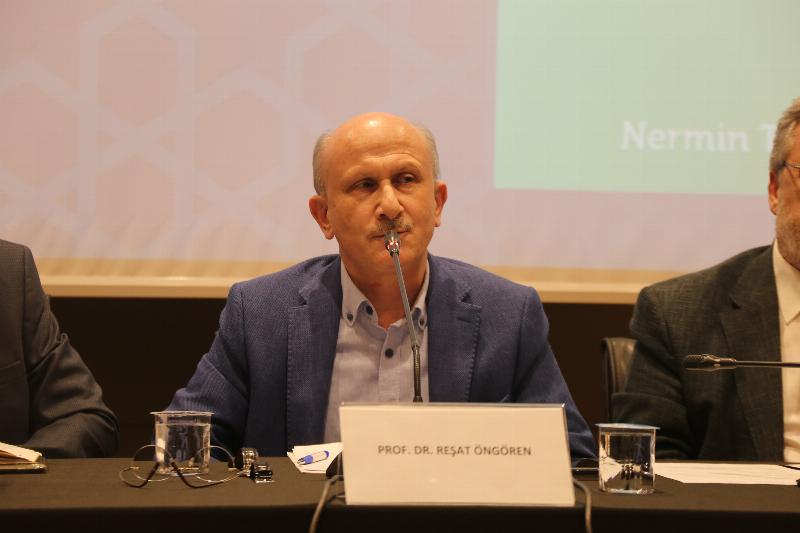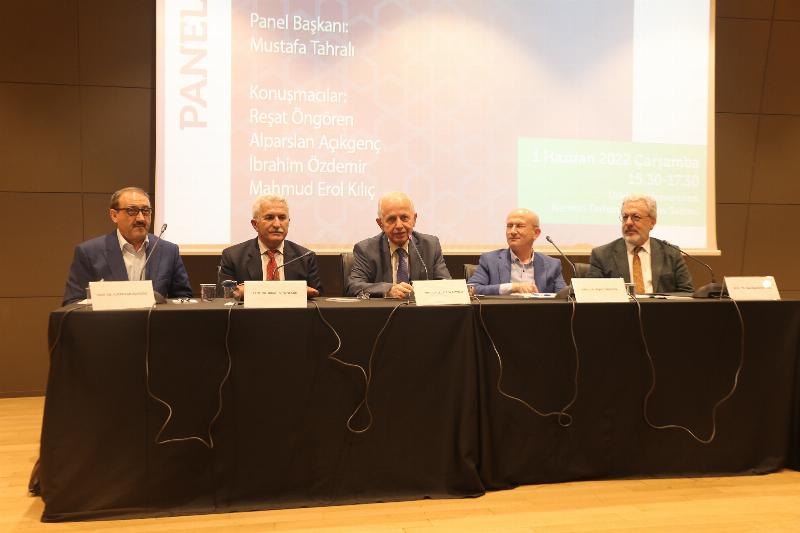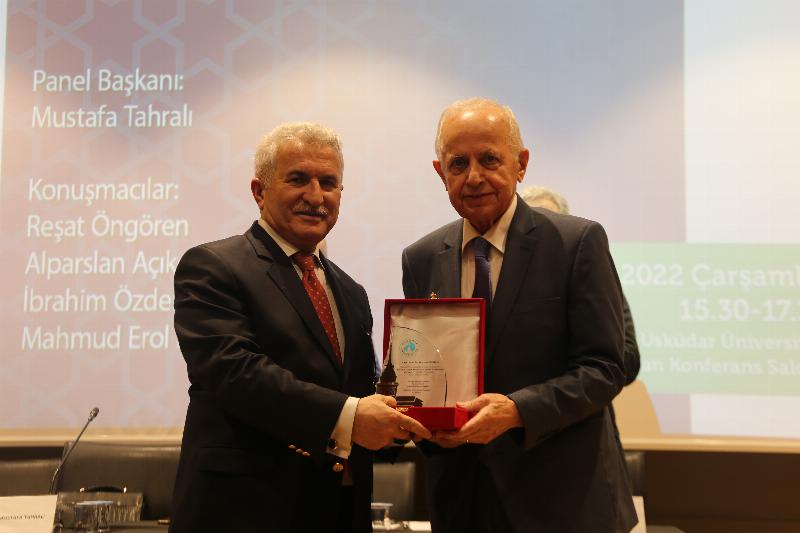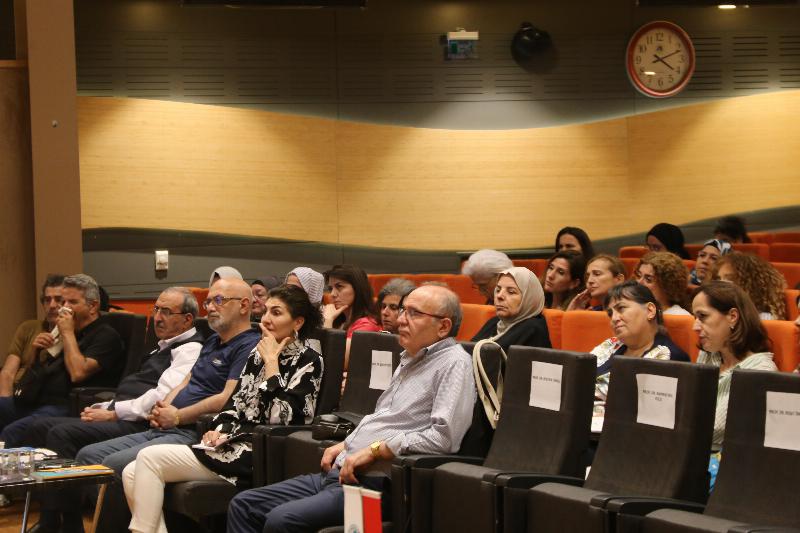As a Culture Bridge from the Ottoman to the Republic ‘Ahmed Avni Konuk’
The "Metaphysical Views of Ahmed Avni Konuk as a Commentator" Panel was held with the contributions of the Faculty of Humanities and Social Sciences, Institute for Sufi Studies and Kerim Foundation.
Those who participated in the program as a speaker under the chairpersonship of Marmara UniversirtRetired Lecturer Prof. Mustafa Tahralı are as follows: Prof. Reşat Öngören from the Institute for Sufi Studies, Dean of Üsküdar University HSSF Prof. İbrahim Özdemir, lecturer of the Department of Philosophy Prof. Alparslan Açıkgenç, Organization of Islamic Cooperation, Director General of Islamic History, Art and Culture Research Center and also a faculty member of the Institute for Sufi Studies Prof. Mahmud Erol Kılıç.
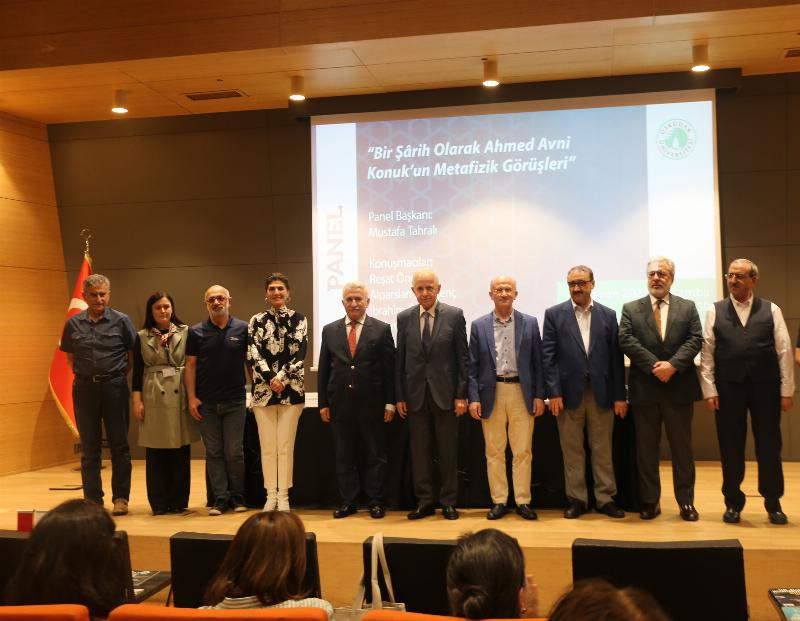
Prof. Mustafa Tahralı: "If Sufism is talked, it is because of Ibn-i Arabi and Rumi"
Tahralı, who discusses metaphysics as spirituality and high mysticism, said: “If there is really high mysticism spoken in Türkiye, it is because of Ibn -I Arabi and Rumi. If we can do this, it is thanks to great people like Ahmed Avni Konuk. He is one of the most prominent of those who introduced Mesnevi (masnavi) to today's world. Avni Konuk annotated the masnavi, which was originally six volumes, in a work of 12-13 volumes. The work was translated into contemporary Turkish, it was prepared for publication and published. This work is as valuable as the Commentary itself, as it enables the work to be read and popularized today. We would like to thank Ahmed Avni Konuk and the Sufi researchers who brought these great works to our day. Again, it is Allah Almighty that we should be grateful for creating such servants. Thank God we have come to this day. These meetings are also a work of him. We organized the first one in 2018 on the occasion of Konuk's 80th anniversary. It brought us together again today. Nor are we dealing with a science that can only be understood by reading the text, or understood by negotiation or reasoning. Thus, there is more. They say this at every opportunity in their commentaries, between the lines, in couplets, with direct quotations from Ibn Arabi from Rumi.”.
Prof. Reşat Öngören: “Ahmed Avni Konuk is one of the figures playing a role as a bridge”
Mentioning how Ahmed Avni Konuk served as a cultural bridge in the transition from the Ottoman Empire to the Republic of Turkey, Öngören said: “When transitioning from one period to a new era, if a bridge figure like Ahmed Avni do not transfer the previous knowledge to the next generation, then there may be a return to the beginning. Sometimes there may be a collapse. With this regard, Ahmed Avni Konuk is one of the bridge figures who transferred the Ottoman Sufi thought and the basic elements of this thought to new generations with his commentaries. Since he was born 50 years before the Republican era. He grew up in the center of Ottoman culture and civilization. He is a person who has been alive for nearly 20 years in the Republican era. He made his works, many of his works before the Republic. This continues even after the Republic. Therefore, he reflected his knowledge on his works by experiencing two periods.”
Prof. Alparslan Açıkgenç: “Ahmed Avni Konuk is a philosopher like Hegel.”
Açıkgenç compared Ahmed Avni Konuk and Hegel and expressed: “Ahmed Avni Konuk is a philosopher like Hegel. He developed the philosophy of Sufism based on Sufism. He is one of the very important philosophers who carried the old mysticism thought to the present day as it was the transition to the republic. Compared to Hegel, Ahmed Avni Konuk should also be evaluated in terms of history of world philosophy. In my opinion, we are leaving Hegel behind. Creation has neither beginning nor end. It says that the abode and the hereafter are valid for hadith beings that have been created. In other words, when we say that this creation is ancient, the seniority of the beings should not be understood. There is an excellent expression, it is necessary to pay attention to it. Therefore, the world has a beginning. It was created from the beginning. If we can say that Allah's creation consists of the moment when it came into existence, if we can say the moment, of course, there is no such thing.”.
Prof. İbrahim Özdemir: “The breath of all existence is merciful”
Özdemir said that we can no longer ignore this invisible sea and continued: “We need to announce his views to the world. When Rumi realized that while his student Hüsamettin Çelebi had his masnavi written with 26 thousand couplets dictated, his student felt sleepy and thought that ‘We are writing, but who will read them?’ Rumi said to him that ‘Write Hüsamettin. Our writings are like April rain. When the time comes, it will make the places where it fell' green.’. It was narrated like that. You see, Avni Bey has neither children nor anyone. He abandoned what he wrote. After 40 years, my teacher Mustafa Tahralı and the late Selçuk Eraydın are discovering them, the manuscript notebooks of the commentaries. Avni Efendi reveals a meaning that radically changes the understanding of the world, and says that the breath of all existence is merciful based on the works of Rumi and İbnü'l-Arabî. Allah has bestowed the body with the breath and the gracious of the whole world. That is to say, in everything, everything we call this soul, everything we call life, that breath is the most merciful."
Prof. Mahmud Erol Kılıç: “One of the most important achievements of the Ummah is Muhyiddin İbnü'l-Arabî”
Talking about Ibn-i Arabi through the eyes of Ahmed Avni Bey, Prof. Mahmud Erol Kilic expressed: “I think one of the most important achievements of the ummah (community) of Islam and the ummah of Muhammad is that he honored us with a person named Muhyiddin İbnü'l-Arabî as a gift from Allah. Many people came as a successor to the inheritance of Prophet Muhammad. May Allah be pleased with them, they all tried to point out his message to us in order. However, we see a founding father in the trust given to Muhyiddin İbnü'l-Arabî. Although it is stated in the verse that 'we do not distinguish between prophets', we know that Prophet Muhammed is like the fact that the ruby is a stone among the stones, however, it is superior to other stones. The Prophet has the highest rank among the prophets. All of the prophets are venerable and we should respect them, but the verse also includes the expression "We have made some of them superior to others". The meaning of 'We have chosen the one who is the chosen from among them' occurs.
And the position of Ibn Arabi in the ulema Kiram is about this way.” With his words, Prof. Kılıç made evaluations that reveal the importance of İbnü'l-Arabî for Avni Konuk.
At the end of the panel, questions from the audience were answered by the speakers. At the end of the program, Panel Chair Prof. Mustafa Tahralı was presented a plaque by the HSSF Dean Prof. İbrahim Özdemi.
Üsküdar News Agency (ÜNA)
